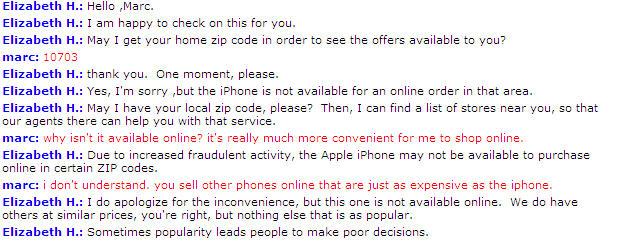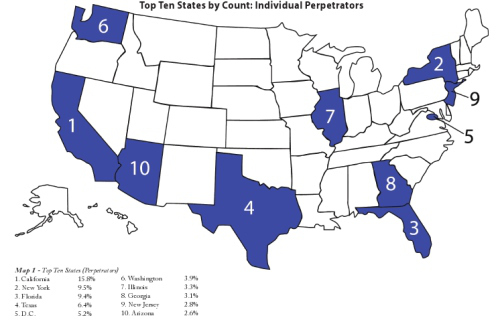AT&T Says Fraud. Consumerist Says O RLY?
AT&T online customer service reps have apparently changed their tune since we first reported yesterday that they were telling potential iPhone buyers that New York “is not ready for the iPhone.” The current line: “Due to increased fraudulent activity, the Apple iPhone may not be available to purchase online in certain ZIP codes.” There’s just one problem: It seems pretty unlikely.
For one thing, it doesn’t jibe with the official statement being offered by AT&T corporate, which makes the change seem routine and ordinary, though it hardly sheds any light on the rationale for blocking New Yorkers: “We periodically modify our promotions and distribution channels.” And the previous CSR statement, about an overtaxed network, is consistent with comments from AT&T customer service chief Ralph De La Vega, who recently warned that data hogs — mostly in New York and San Francisco — would soon get their comeuppance.

Additionally, AT&T continues to offer similarly priced smartphones online, even to New Yorkers. A CSR told us that those aren’t as popular as the iPhone and that “sometimes popularity leads people to make poor decisions.”
The “increased fraudulent activity” statement doesn’t make sense for another reason: it’s inconsistent with available data about Internet fraud. One of the more reliable sources for information about online fraud is the annual Internet Crime Report (PDF) published by the FBI and the National White Collar Crime Center. In the 2008 edition of this report, New York is the No. 2 state for Internet fraud, accounting for 9.5% of all reported cases. Pretty bad, right? Maybe AT&T has a point.

(Source: Internet Crime Report (PDF), 2008)
Then again, maybe not. Residents of California, the No. 1 state on the list (with 15.8% of fraud cases), haven’t been blocked from buying iPhones online. Nor have those in No. 3, Florida, which has 9.4% of all cases. And on a per-capita basis, the leaders are Washington, D.C., Nevada and Washington state — all places where the iPhone is available for purchase online. (We checked a number of zip codes in each of these states and the District of Columbia, and the iPhone was available in all of them.)
Of course, the report is based on 2008 data, and AT&T’s reps cite “increased fraudulent activity” as the reason many New Yorkers can’t buy an iPhone online. However, we have yet to find a single source to back up the CSR claim, and a request for more info from AT&T remained unanswered at the time we published this post.
AT&T has every right to set its own agenda, and to change its “promotions and distribution channels” any time it wants. And the company may have its own data showing that locations like Manhattan’s Upper East Side, Chappaqua in Westchester County, and Glen Head on Long Island, are hotbeds of internet fraud. But given the inconsistent responses from the company, and the available evidence, we’re inclined to believe that the first CSR we chatted with may have been on the mark with her statement that New York “can’t handle the iPhone.” Which really means AT&T can’t handle New York.
Update: New York customers are now able to order iPhones via AT&T’s Web site. It would appear that the company has once more modified its “promotions and distribution channels.” We’ve requested a statement from AT&T, and will update this post if and when we receive it.
Want more consumer news? Visit our parent organization, Consumer Reports, for the latest on scams, recalls, and other consumer issues.


